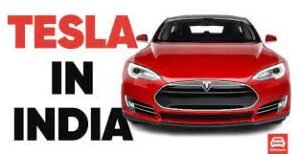
In a seismic development that could reshape the automotive narrative in India, Tesla, the electric vehicle (EV) juggernaut, is deliberating a monumental $2 billion investment for manufacturing operations in the country. However, this ostensibly straightforward move is riddled with conditions, unveiling a complex interplay of industry dynamics, government policies, and the evolving landscape of sustainable mobility.
The prospect of Tesla’s entry into the Indian market has been a topic of speculation for years. Recent developments, however, indicate that the electric vehicle giant is not merely contemplating a presence but mulling over a manufacturing stronghold. The proposed $2 billion investment is not just a financial commitment; it represents a strategic maneuver to localize production and address the surging demand for electric vehicles in the Indian subcontinent.
The Landscape Shift:
Tesla’s ingress into the Indian market has long been anticipated, and the potential $2 billion investment signals a substantial commitment to localizing production. This move aligns seamlessly with Tesla’s global strategy, echoing the company’s pursuit of meeting the escalating demand for electric vehicles.
Conditions: The Fine Print of Tesla’s Commitment

The magnitude of Tesla’s investment is matched only by the specificity of the conditions tethered to it. Sources intimate that Tesla is meticulously scrutinizing the Indian government’s stance on import duties for electric vehicles. This vigilance is not arbitrary; it sets the stage for the conditions that may delineate the trajectory of Tesla’s investment.
Import Duty Dynamics
Central to Tesla’s conditions is the intricate realm of import duties. The Indian government’s approach to import duties for electric vehicles has emerged as a linchpin in Tesla’s decision-making process. The company, seeking a reduction in these duties, is navigating the regulatory landscape with a discerning eye on how these policies could mold the competitiveness of its electric vehicles in the Indian market.
Concessional Duty Approval
Delving deeper, one discovers that Tesla’s $2 billion investment is contingent on securing concessional duty approval for its imported vehicles. The company is purportedly advocating for a 15% concessional duty approval, a move poised to exert a substantial influence on the pricing dynamics of Tesla’s vehicles in India. The conditions articulated by Tesla shed light on the company’s concerted efforts to render its electric vehicles more accessible to the Indian consumer base.
Increased Investment with Import Duty Reduction
In a noteworthy twist, emerging reports hint at Tesla’s willingness to augment its initial $2 billion investment if the Indian government accedes to a more substantial reduction in import duties. This revelation reveals strategic flexibility in Tesla’s investment plans, demonstrating responsiveness to favorable conditions set by Indian authorities.
Local Procurement and Auto Components
Beyond the financial commitment, Tesla’s pledge to enhance local procurement of auto components stands out as a significant facet of its India strategy. The company is signaling a collaborative effort with Indian suppliers, contributing not only to its manufacturing ecosystem but also catalyzing growth in the domestic automotive industry.
Government Collaboration and Regulatory Environment: A Nexus of Influence
Tesla’s intricate dance with the Indian government holds paramount importance in shaping the investment landscape. The response of the government to Tesla’s conditions, especially regarding import duties and regulatory considerations, becomes a linchpin. The degree of collaboration and alignment between Tesla and Indian authorities will play a pivotal role in determining the success and scope of Tesla’s manufacturing operations in India.
Conclusion: A Pivotal Moment for India’s Automotive Future

Tesla’s potential $2 billion investment in Indian manufacturing signifies a critical juncture for the automotive industry in the country. The conditions tethered to this investment transcend monetary figures; they embody a strategic interplay between a global industry leader and the regulatory landscape of a burgeoning market.
As India embarks on its journey towards sustainable mobility, Tesla’s entry with a substantial investment could catalyze a paradigm shift. The intricate negotiation of conditions reflects not only Tesla’s strategic intent but also the complexity of navigating diverse regulatory frameworks. In the coming months, the unfolding collaboration between Tesla and the Indian government will undoubtedly shape the contours of the electric vehicle industry in India, setting the stage for transformative growth.











Comments 3